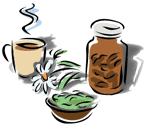|
To combat the symptoms of menopause, many women have used
hormone replacement therapy (HRT) for decades. These hormones
were recently linked to chronic health problems, though, prompting
women to seek alternatives to HRT. Alternative therapies like
herbs, soy products and meditation are now
being used to prevent the hot flashes, sleep problems, joint
pain, fatigue and forgetfulness of menopause. But which ones
actually work?
In a review of 29 studies of complementary and alternative
medicine (CAM) therapies for menopausal symptoms, the authors
of this study in the Annals of Internal Medicine compared
the effectiveness of various alternative treatments for menopause
symptoms.
 Black cohosh, an herb traditionally used by Native Americans
to treat gynecological conditions, won out as the most beneficial
treatment for mitigating hot flashes in three out of four
studies. Black cohosh appears to effectively treat menopausal
symptoms, but there is a lack of long-term safety research,
so caution is in order if considering long-term use. Also,
soy or isoflavone supplementation appeared moderately beneficial
for treating hot flashes, but evidence was less conclusive
- only three of eight studies involving treatment of at least
six weeks resulted in significant improvements. Black cohosh, an herb traditionally used by Native Americans
to treat gynecological conditions, won out as the most beneficial
treatment for mitigating hot flashes in three out of four
studies. Black cohosh appears to effectively treat menopausal
symptoms, but there is a lack of long-term safety research,
so caution is in order if considering long-term use. Also,
soy or isoflavone supplementation appeared moderately beneficial
for treating hot flashes, but evidence was less conclusive
- only three of eight studies involving treatment of at least
six weeks resulted in significant improvements.
Disappointingly, nearly all the other alternative menopause
treatments in the study - acupuncture; vitamin E; evening
primrose oil; wild yams; ginseng; dong quai; and red clover
- do not appear to offer any benefits for treating hot flashes,
based on existing clinical studies. Now is a good time to
talk with a doctor of chiropractic about where you can turn
for the best, and safest, options for dealing with the frustrating
effects of menopause.
Reference:
Kronenberg F, Fugh-Berman A. Complementary and alternative
medicine for menopausal symptoms: A review of randomized,
controlled trials. Annals of Internal Medicine 2002:137(10),
pp. 805-813.
Find additional women's health topics at https://www.chiroweb.com/find/archives/women.
|



